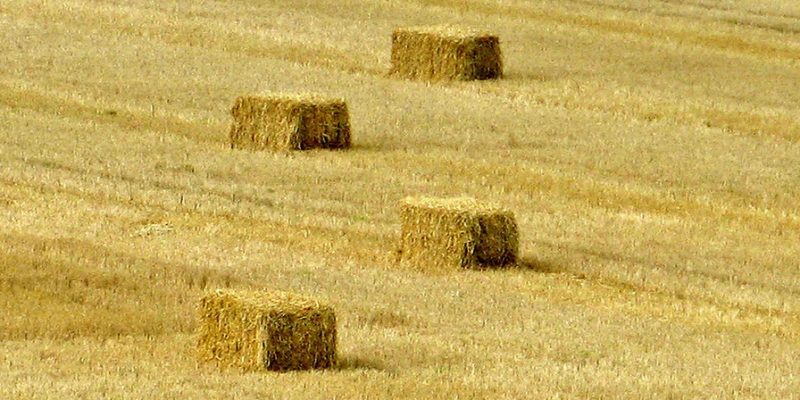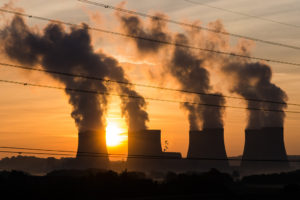An Unexpected Alternative to Fossil Fuels: Waste
What used to be considered waste is now seen as raw material for producing biogas, a viable energy alternative to nuclear and fossil fuels. Bales of straw on a farm in Sweden. (Olof Senestam / Flickr)
Bales of straw on a farm in Sweden. (Olof Senestam / Flickr)
Countries with large quantities of waste from forestry, manure or straw from farms are now looking for economic ways to turn them into forms of renewable energy.
Most of these so-called wastes can be burned directly as an alternative to fossil fuels in power stations or for district heating, but increasingly they are being turned into biogas.
This can be used as fuel in vehicles, fed into gas pipelines as a addition to natural gas, or to be used to generate electricity when there is a shortfall from other renewables like wind and solar.
Two countries keen on exploiting these natural resources to enable them to phase out fossil fuels and nuclear power are Sweden and Switzerland.
Sweden has a large surplus of straw from agriculture in the autumn, but finding an economic use for it has been difficult.
Waste Straw
So the government, farmers and those with waste straw from other manufacturing processes appealed to the RISE scientific research institutes in Stockholm and the Swedish University of Agricultural Sciences (SLU) to try to find a solution.
After two years of experimenting with straw briquettes and pellets to see if straw could be broken down into biogas by microbes in a digester, the scientists have concluded it can work well.
By mixing it with other wastes − for example from food, which is already used for producing biogas − the whole process could be made both more productive and faster.
Ilona Sárvári Horváth, associate professor in the Department of Resource Recovery and Building Technology at the University of Borås, says: “In the experiments, we have added straw to food waste in different proportions.
“The results show that the biogas production gets better because straw has a higher dry matter content, which means you can feed more material into the reactor that produces the gas. This makes you yield more gas per volume in a shorter time.”
She says that straw as a substrate for biogas production can provide better profitability, both in the biogas sector and in agriculture.
More than 30 organisations are involved in the Biogas2020 project, including companies and municipalities from Sweden, Norway and Denmark that all want to use straw in anaerobic digesters.
In Switzerland, which has both a large forestry and farming sector, biomass is already seen as a key resource. Currently, the country produces around 5% of its total energy needs from biogas − mainly wood waste from forestry.
To see what more can be done, the Swiss Federal Institute for Forest, Snow and Landscape Research (WSL) has completed a comprehensive assessment of the potential of biomass energy in Switzerland.
While wood is the most obvious resource, the Swiss also looked at farmyard manure, organic waste, sewage sludge and by-products of agricultural crops such as straw, all of which contain valuable energy.
They found that it was theoretically possible to produce 19% of Switzerland’s total energy consumption from biofuels − equivalent to 4.8 million tonnes of crude oil.
Best Opportunities
However, not all of this is exploitable because some of the wood is on inaccessible mountain slopes and some farms produce only small quantities of usable materials in remote places.
As a result, slightly less than half of the total could be sustainable, which they defined as environmentally-compatible and cost-effective. They also decided that forest wood and manure offered the two best opportunities.
The research calculated that, across all biomass categories, it would be possible to exploit roughly twice as much biomass in Switzerland as is currently being used mainly to generate heat and electricity.
Even though the amount of energy in question would “only” correspond to roughly 9% of Switzerland’s gross energy consumption, energy can be extracted from biomass in a far more controlled manner than from wind and sunlight.
Biomass could thus compensate for the fluctuation of other renewable energies and help to avoid energy bottlenecks.
Although the researchers believe more work is needed to assess how best to use these materials, they conclude: “This makes biomass a valuable raw material that is already available in Switzerland and can be efficiently converted into energy.”
Your support is crucial…With an uncertain future and a new administration casting doubt on press freedoms, the danger is clear: The truth is at risk.
Now is the time to give. Your tax-deductible support allows us to dig deeper, delivering fearless investigative reporting and analysis that exposes what’s really happening — without compromise.
Stand with our courageous journalists. Donate today to protect a free press, uphold democracy and unearth untold stories.






You need to be a supporter to comment.
There are currently no responses to this article.
Be the first to respond.